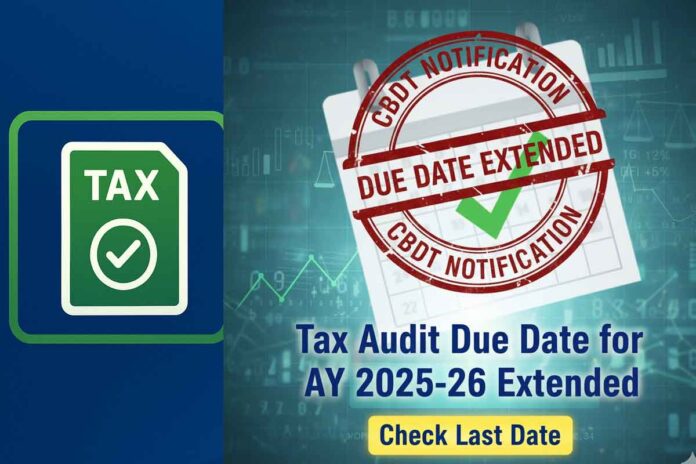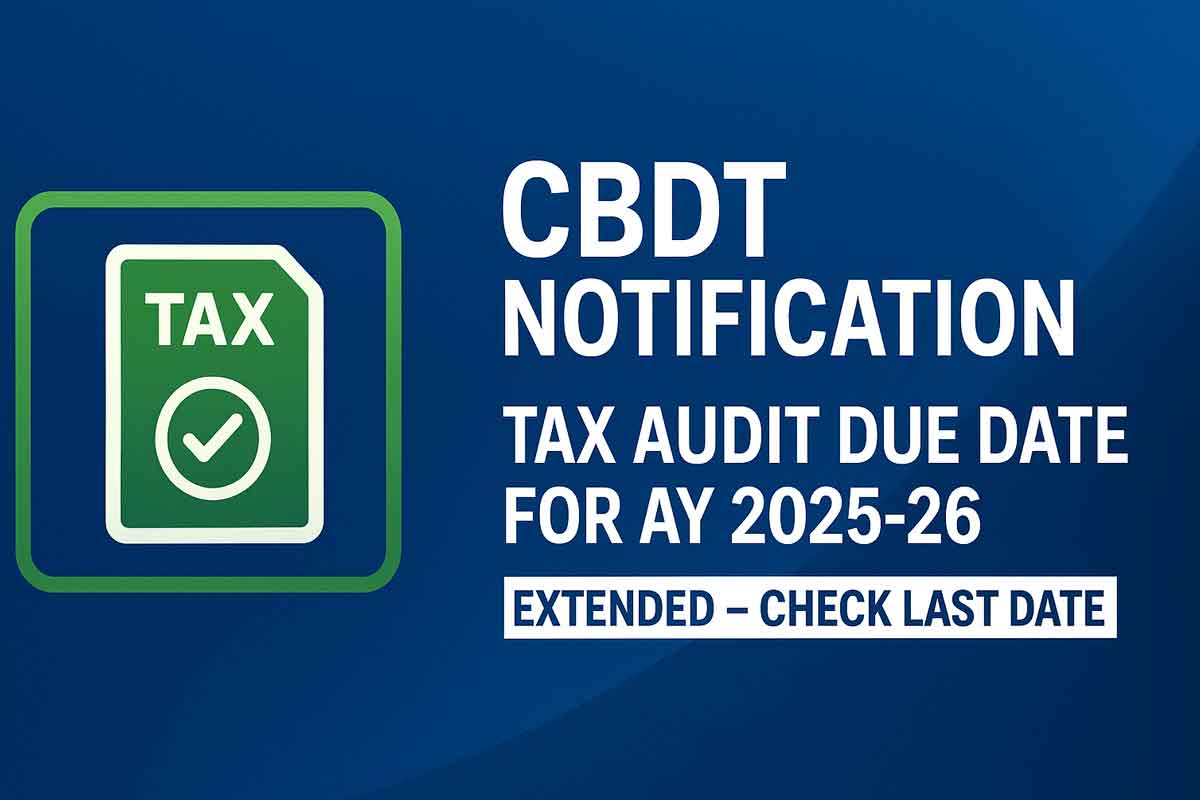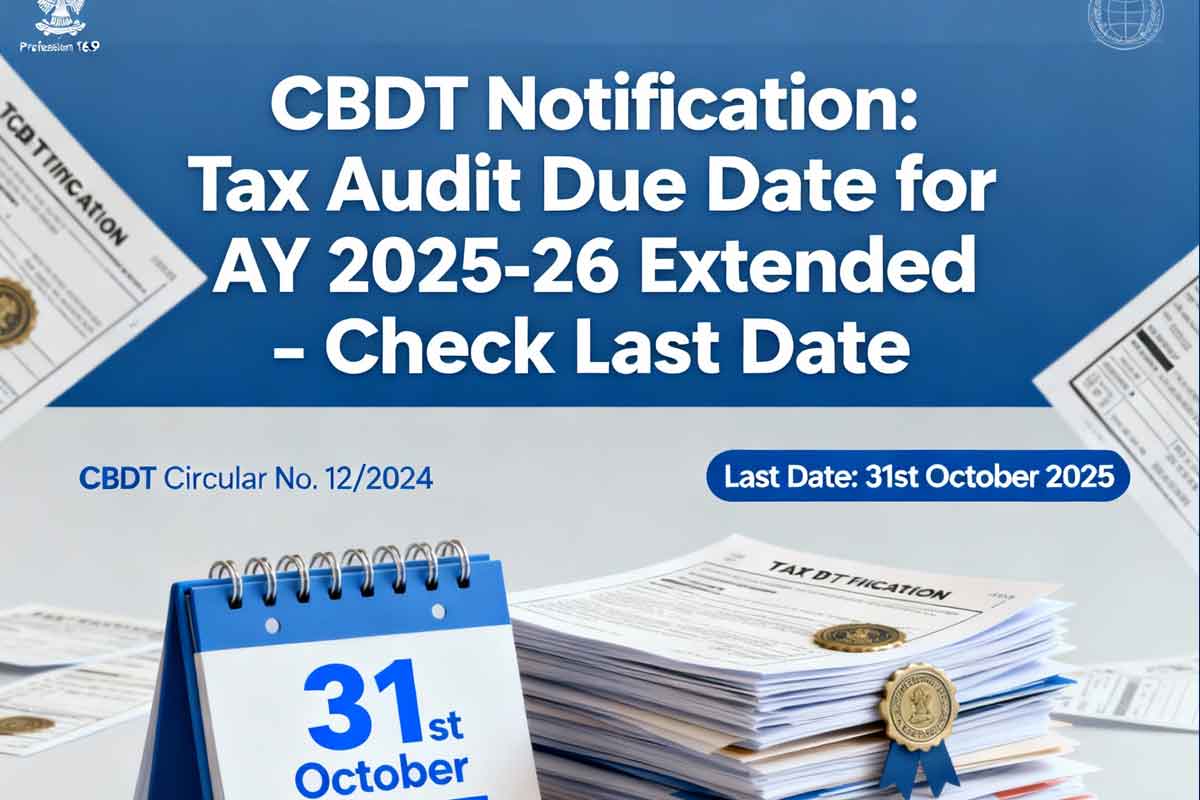The Central Board of Direct Taxes (CBDT) has officially announced an extension in the tax audit due date for Assessment Year 2025-26.
This CBDT extension brings major relief for taxpayers, businesses, and tax practitioners facing compliance pressure during audit season.
As per the latest CBDT notification, the due date for filing tax audit reports under Section 44AB of the Income Tax Act has been extended from 30 September 2025 to 31 October 2025.
Additionally, the ITR filing due date for audit cases has been extended from 31 October 2025 to 10 December 2025.
Why CBDT Extended the Tax Audit Due Date
The tax audit due date extension was granted after multiple professional bodies and state High Courts requested relief, citing portal slowdowns, utility delays, and workload challenges.
Tax practitioners highlighted that completing audits and ITR filing within the original deadlines was becoming increasingly difficult.
- The Punjab & Haryana High Court directed CBDT to extend ITR deadlines for audited cases.
- Subsequently, CBDT extended the tax audit report deadline and ITR due date for AY 2025-26.
- This ensures taxpayers can file accurate reports without fear of legal non-compliance.
Tax Audit Report Deadline Date
As per the latest CBDT notification for extension of due date:
- Tax Audit Report Due Date: 31 October 2025
- ITR Filing Due Date (Audit Cases): 10 December 2025
- Assessment Year: 2025-26 (Previous Year 2024-25)
This tax audit due date for AY 2025-26 applies to all entities required to get their accounts audited under Section 44AB — including businesses, professionals, LLPs, and companies.
What Is a Tax Audit and Who Needs It?
A tax audit under Section 44AB is a review of accounts conducted by a Chartered Accountant to ensure accuracy of income declarations and compliance with tax law.
It is mandatory when:
- Business turnover exceeds ₹1 crore (or ₹10 crore if digital receipts are ≥ 95%).
- Professional receipts exceed ₹50 lakh in a financial year.
- The taxpayer opts out of the presumptive taxation scheme.
The income tax audit due date extension latest news therefore directly benefits large and medium-sized businesses and practicing professionals.
Role of Tax Practitioners
Tax practitioners — including Chartered Accountants and consultants — are key in ensuring correct filing of the tax audit report (Forms 3CA/3CB & 3CD) and subsequent ITR.
The CBDT extension gives them an extra month to finalize reports, verify records, and prevent penalties under Section 271B.
Which ITR Forms Are Used After Tax Audit?
Depending on the entity type, the following ITR forms are generally used post-audit:
- ITR-3: Individuals or HUFs engaged in business/profession and required to be audited.
- ITR-5: Partnership firms, LLPs, AOPs or BOIs subject to audit.
- ITR-6: Companies (excluding those claiming exemption under Section 11).
Legal Action for Missing the Due Date
If taxpayers fail to file the audit report by the extended due date, Section 271B of the Income Tax Act allows penalties up to ₹1.5 lakh or 0.5% of turnover, whichever is lower.
Such non-compliance can also delay refunds and increase scrutiny during assessment.
Summary of Key Dates (AY 2025-26)
- Tax Audit Due Date: 31 October 2025
- ITR Due Date (Audit Cases): 10 December 2025
- Applicable Law: Section 44AB, Income Tax Act 1961
- Penalty Section: 271B
Disclaimer
This article is for informational purposes only and should not be treated as tax advice.
Readers are advised to consult a Chartered Accountant or tax practitioner before acting on the basis of this information.
All details are based on the latest CBDT notification and media reports as of October 2025.
FAQs
Q1. What is the new tax audit due date for AY 2025-26?
The tax audit due date for AY 2025-26 has been extended to 31 October 2025 by the CBDT.
Q2. What is the last date for ITR filing in audit cases?
For taxpayers subject to audit, the ITR filing due date has been extended to 10 December 2025.
Q3. What happens if I miss the extended audit deadline?
If the audit report due date extension is missed, penalties up to ₹1.5 lakh or 0.5% of turnover may apply, as per Section 271B of the Income Tax Act.



